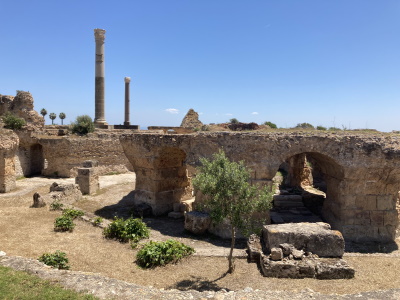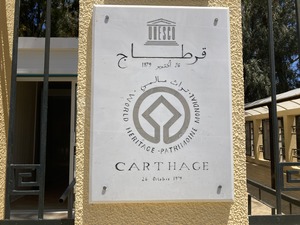Carthage

The Archaeological Site of Carthage comprises the remains of an influential commercial city and port from Antiquity, whose literary renown has continued.
Founded by Phoenician colonists around 814 BCE, the prosperous city became the cradle of Punic civilization and the major maritime power in the Mediterranean. After it destroyed the city in the Third Punic War in 146 BCE, Rome founded a colony at the same site. The city blossomed again and many monumental structures were built such as a large amphitheater. It became one of the most important cities of the Roman Empire and a center of early Christianity.
Community Perspective: The site can be “a bit disappointing because not much is left”. From the Punic period, the port area and the Tophet are worth visiting, as well as the Baths from Roman times. Be aware that the locations are all separate “islands”, spread across a large area, with their own access (fortunately you have to pay only once).
Map of Carthage
Community Reviews
Els Slots

Carthage may not be Tunisia’s grandest attraction anymore, its rich and powerful empire by far superseded the importance of the country it currently is part of. Unfortunately, not a lot is known about the cultural history of the Carthaginians – most books focus on the military history and their battles with the Romans (using sources written by Romans). You'll know enough if you listen to only one podcast on that subject. At an exhibition on Punic Carthage that I visited in Leiden in 2015, I found more to my taste (those white and blue glazed pendants!). The accompanying book, “Carthage: fact and myth”, still is the best one I could find as it covers a range of topics including the Punic writing system, the relationship with the Numidians, and its influence on European art.
I choose to do a half-day tour with Le Lemon Tour for my real-life visit. They own a bicycle shop in Carthage and conduct tours – on a bike of course! - to the archaeological sites. They are very professional and you can also just rent a bike to explore the area on your own. That a bike is such a good way of transportation here, also says a lot about the terrain. The sites are all separate “islands”, with their own access, in between the quiet and prosperous residential areas. Fortunately, you have to pay your entrance fee only once: for 12 TD (4 EUR) you can visit the 8 associated sites and they will stamp your ticket at each location.
We started our tour at the Tophet. During the whole itinerary today I tried to concentrate on the Punic aspects and 'think away' the later Roman ones, but this is a Punic location only. Here they buried their children in amphoras, with hundreds of headstones still remaining. The headstones show writing in the Phoenician alphabet and depictions of local gods such as Tanit. It’s a very atmospheric place, especially because of the many trees. One of the species present, the pomegranate, even was named after the Punic: its Latin name is Punica granatum.
We then cycled on towards the Punic harbour. As its naval fleet was Carthage’s greatest asset, they built a military harbour with restricted access behind the commercial harbour. The commercial one was rectangular, the military one circular shaped. The current 2 Tunisian dinar coin shows these two connected harbours very nicely. We cycled along both, but the best views may be had from Byrsa hill. It’s a long distance away, but the shapes can be clearly seen.
Byrsa Hill probably is the main location of this WHS. It has remains from Punic, Roman and colonial times. Here we also encountered the most other tourists. The Punic ruins consist of a residential quarter, now signposted as “the Hannibal district”. It had houses and shops in a fan-shaped plan, that suited the steep terrain.
We further visited remains from the Roman period: the Roman theatre and the Antonine Baths. The baths are the most impressive Roman remains, especially because of their size and their elaborate setup. It really was a spa ‘avant la lettre’, with a huge variety of baths and pools. Except for Byrsa Hill, all locations we visited were very quiet and the roads between them as well. So I had a very pleasant cycling tour and I am happy that I have seen the works of the Carthaginians with my own eyes.
Read more from Els Slots here.
Zoë Sheng
Chinese-Canadian - 06-Apr-22 -
I'm not even bothering to look for fitting pictures. The site is spread out far enough that on foot you may not cover all especially as some require crossing roundabouts, but you should do the bath, villas, amphitheater and the museum. They are all covered by one ticket.
I took the train from downtown Tunis all the way across which costs hardly anything and takes for 30 minutes. Your stop will be very close to the baths.
Overall there isn't much left of the place and I've seen much better ruins. As far as I understand, and don't take my word for it, the city was destroyed in favor of keeping Dougga. It's historically still important but not impressive.
Highlights were more to see the rich area of Tunisia and great lunch at the Tennis club just nearby the museum.
Dr. Owen Mifsud
Unfortunately not much of what was Carthage remains today. The museum however, explains really well its tragic past and former glory. Beautiful statues, figures and parts of buildings abound in the museum. The museum is right next to a Christian Cathedral that is worth visiting. We also got to see the Roman Amphiteathre and the Antonine Baths - the remains of the Roman Empire that conquered the Carthaginians. Carthage abounds with many historical places and we had planned only a day tour of the area and thus managed just a few sites. I would suggest spending a longer period to visit Carthage and the nearby towns and Capital city.
Ian Cade

There is not much left to see of Carthage which really is a testament to the Romans who totally obliterated their biggest rival of the period. It is pretty important therefore to get some background knowledge on the place before you go because it really is quite impressive.
The main site on Bysra Hill has some very impressive views across Tunis and to the Cape Bon Peninsula. If you go for a bit of a walk you will see that there are a few more intact bits below the forum. Then if you head down to the sea at the Punic Ports this is perhaps the best area as the lay-out of the ports that once held the mightiest navy in the world are still there, and next to them is the Tophet where it is reported that Child sacrificing went on, and the stalea that litter the site can be seen as an eerie testament to that. Further along to coast are the Roman Baths which are huge and probably the most impressive site to look at.
Carthage is very easy to get to from central Tunis there is a TGM train that runs there from the end of Ave. Boiurigibba (the main avenue) it takes about 25 minutes and there are four stations scattered around the sites to help you get around. The locals are ridiculously friendly and helpful
Kelly Henry
Carthage is a bit disappointing because not much is left but the trip alone is worth it. Take an electric trolley from Tunis and you can walk to the main part of the site from the Carthage Hannibal trolley stop. The museum is quite good but watch out for "freelancing" guides. The Roman mosaics in the courtyard of the museum are breathtaking and are just casually laying everywhere you look. Also, the view of the sea is fantastic from the hilltop. We tried to find the stadium but never could. Watch your belongings on the trolley!
Klaus Freisinger
I agree with the other posters that the present site doesn´t offer as much to see as one might expect, which is only understandable if you know what the Romans did to Carthage (completely razed the city, killed or enslaved its people and poured salt on the ground so that nothing would ever grow there again). However, a Roman city did eventually form there, and its ruins are still impressive, especially the baths. You mustn´t take pictures of the Tunisian President´s palace nearby, so beware! The guards may take your camera away! Anyway, besides the very few genuinely Carthaginian remnants and the great view of the sea, the most important thing is just to go there and to know that you´re standing on the site of one of the world´s great civilizations - one that brought mighty Rome almost to its feet.
Community Rating
- : Inigo Cia Haining Guan WalGra Aspasia MohamedOuali Priyaranjan Mohapatra Persian Globetrotter Yamen
- : Stanislaw Warwas
- : Klaus Freisinger Thibault Magnien Randi Thomsen Sachin M. Huineman de la Cuadra Drazsika Christoph Tarquinio_Superbo Juropa Sophie Mikeyboyracer Adrian Turtschi Cutecid Javier
- : Els Slots Mikko Roman Raab Naim Y Xiquinho Silva Alexander Lehmann Christravelblog SaoDies Hanming CugelVance Zach Federico P. Ssong.x
- : Solivagant Ivan Rucek Martina Rúčková Eric PK Wojciech Fedoruk Juha Sjoeblom Cobaltrage Lucio Gorla Riomussafer Philipp Leu Dutchnick GeorgeIng61 Pincze Wimmy
- : Ian Cade Philipp Peterer Peter Lööv Cezar Grozavu Svein Elias MoPython Felicité
- : João Aender Stanimir Zoë Sheng Krijn Argo George Gdanski Squiffy Merveil
- : Walter
Site Info
- Full Name
- Archaeological Site of Carthage
- Unesco ID
- 37
- Country
- Tunisia
- Inscribed
- 1979
- Type
- Cultural
- Criteria
-
2 3 6
- Categories
- Archaeological site - Phoenician
- Link
- By ID
Site History
2007 Name change
From "Site of Carthage" to "Archaeological Site of Carthage"
1979 Inscribed
Site Links
Unesco Website
Official Website
Related
In the News
Connections
The site has 30 connections
Constructions
Damaged
Geography
History
Human Activity
Individual People
Science and Technology
Timeline
Trivia
Visiting conditions
WHS Hotspots
Visitors
273 Community Members have visited.
The Plaque
 (photo by Els)
(photo by Els)